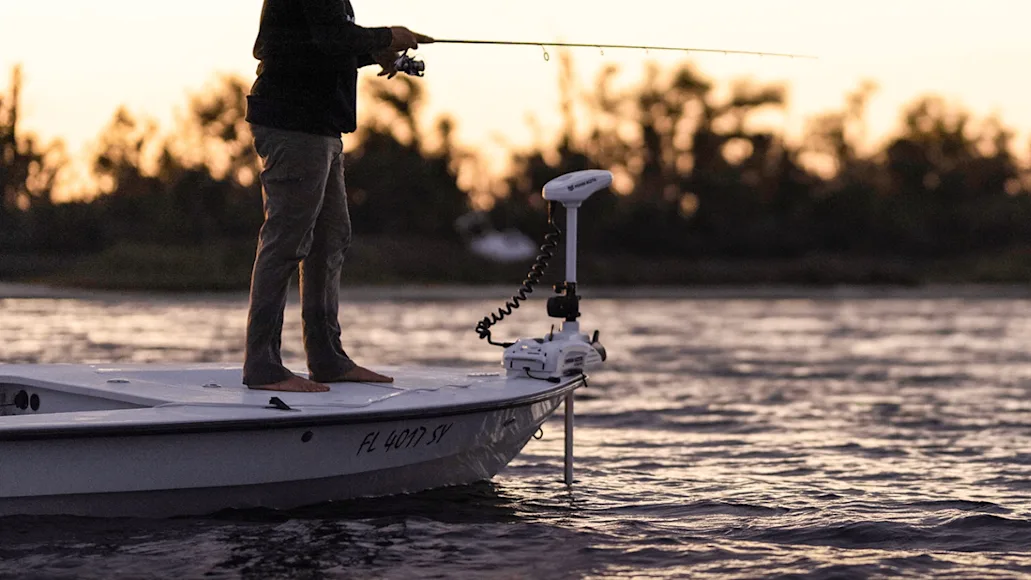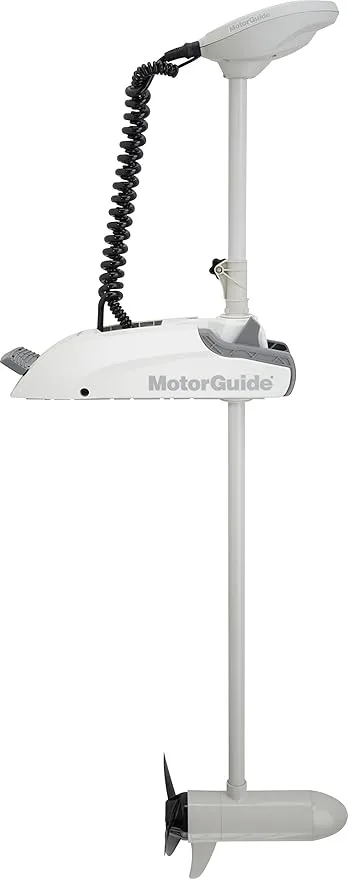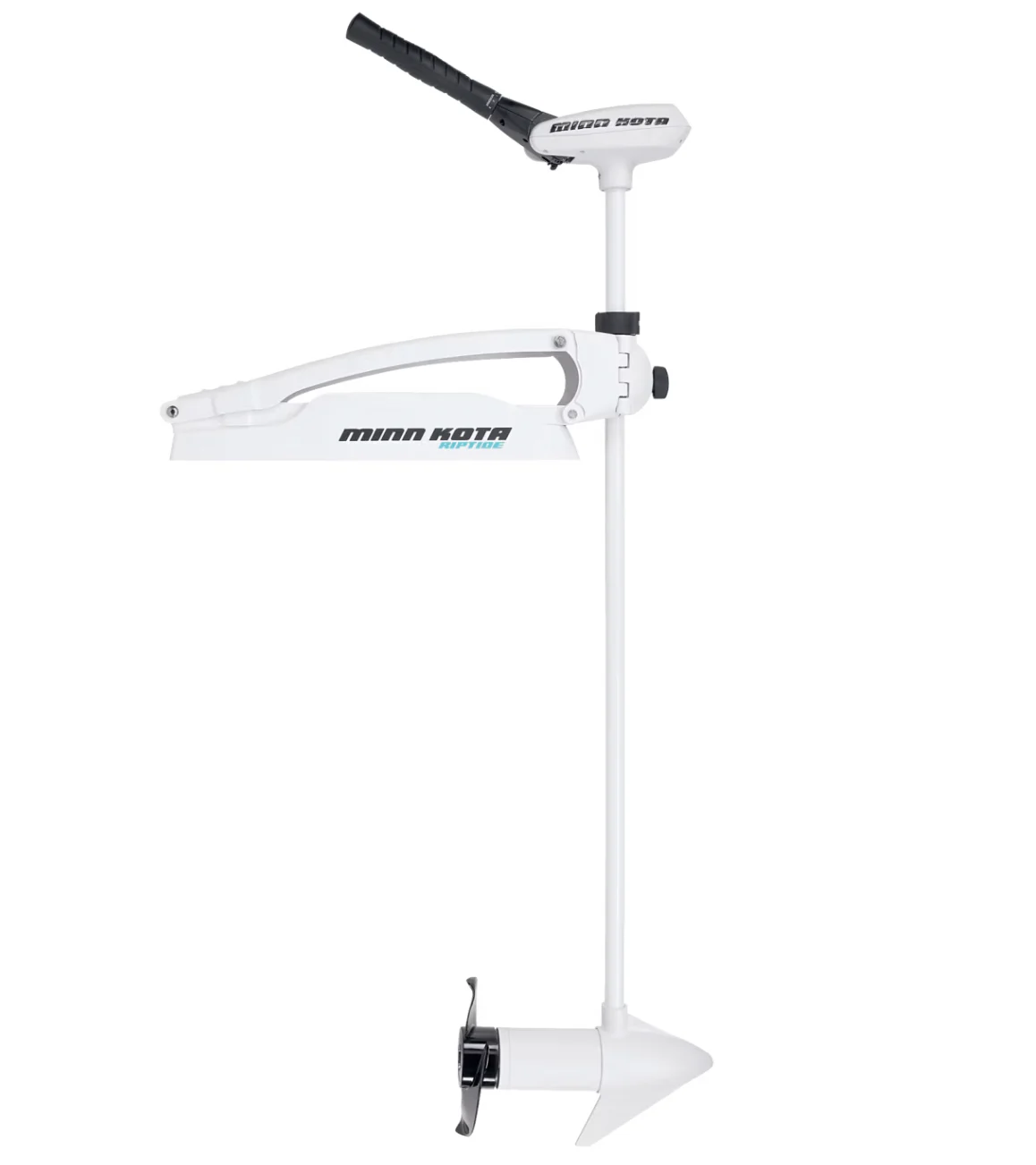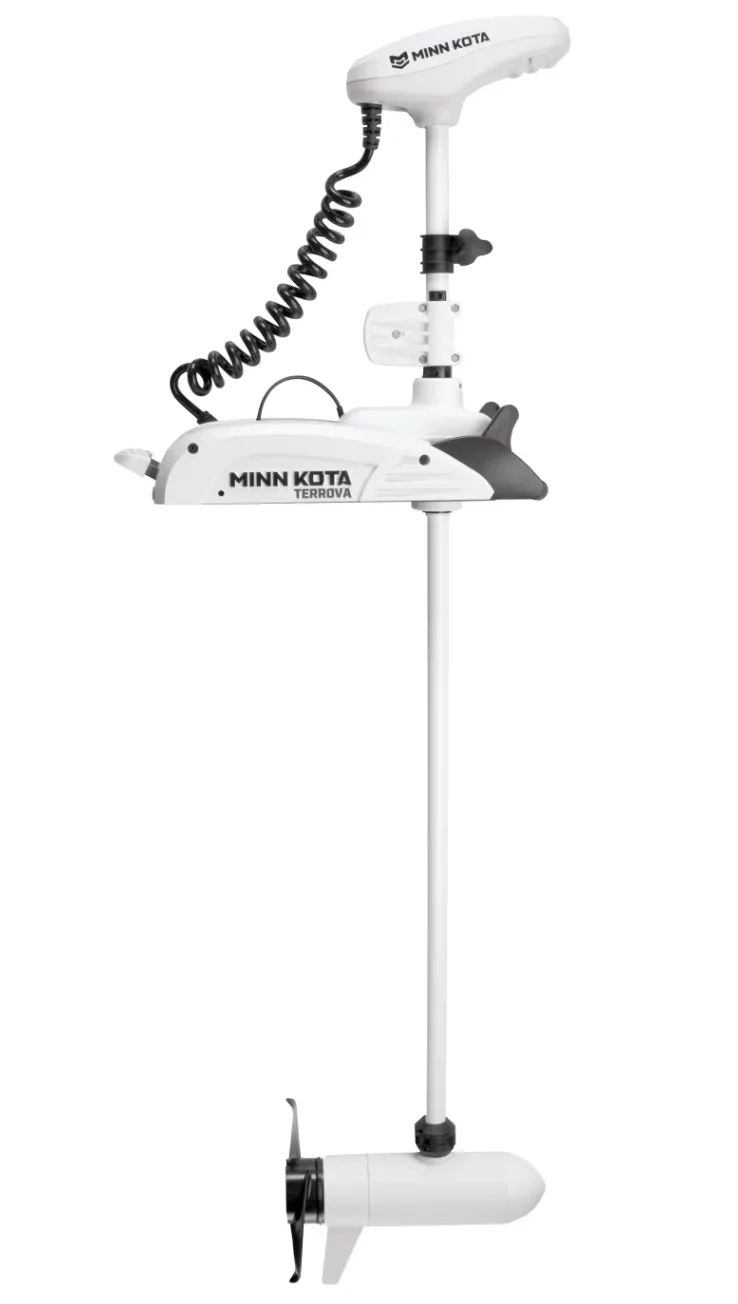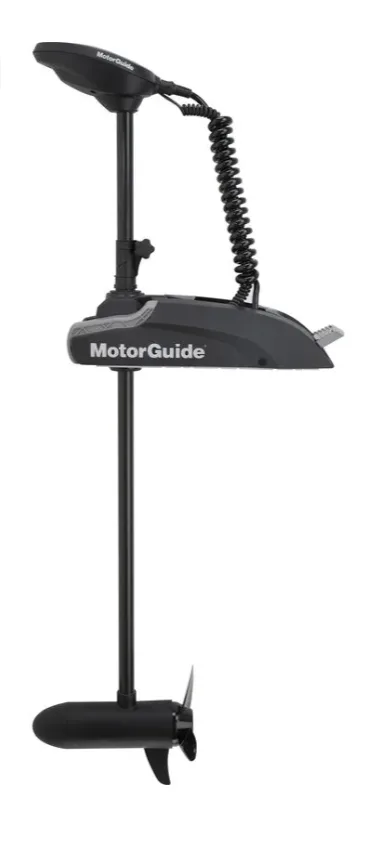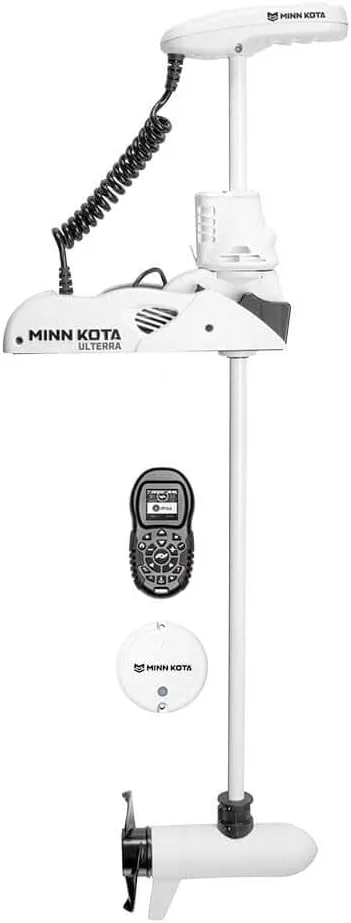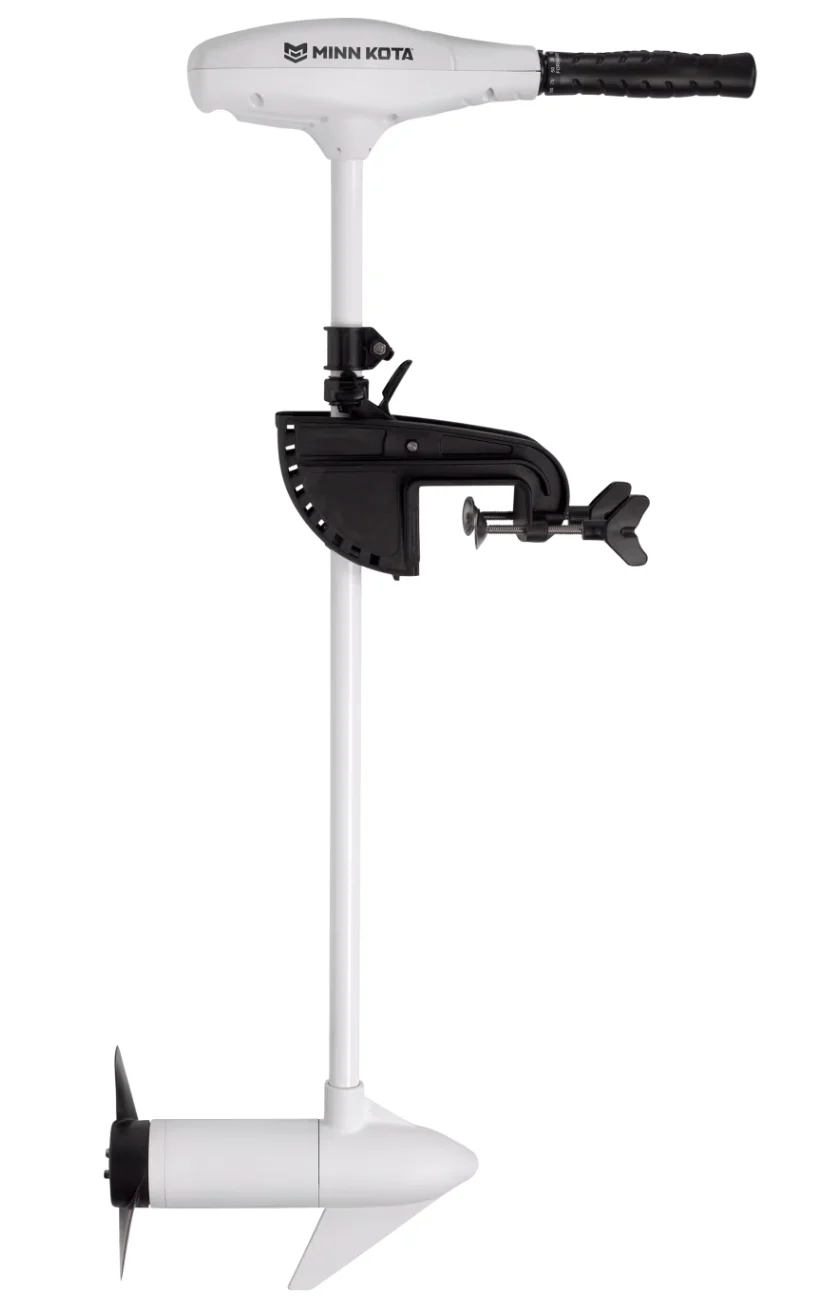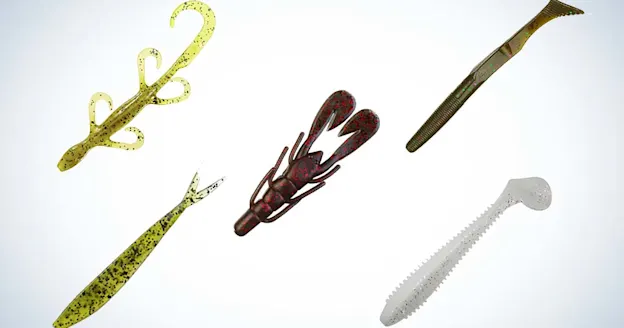We may earn revenue from the products available on this page and participate in affiliate programs. Learn more ›
Whether you’re sneaking around shallow flats or anchoring on an offshore reef, saltwater trolling motors can get you where you need. Unlike their gas-powered counterparts, trolling motors run off of marine batteries. Advances in technology have made these motors easy to operate and efficient. What they lack in power, they make up for in maneuverability and stealth, giving you greater boat control.
Most models come paired with wireless remotes so anglers can control them from anywhere on the boat. Throw in GPS features to keep you in place and it’s obvious why most inshore boats are adding trolling motors. Here are my top choices for the best saltwater trolling motors if you want to take your fishing to the next level.
The Best Saltwater Trolling Motors
Best Overall: MotorGuide Xi3 Saltwater Wireless Remote Trolling Motor with GPS
Best Budget: Minn Kota Riptide Maxxum Bow Mount Saltwater Trolling Motor
Best with Spot Lock: Minn Kota Riptide Terrova Bow Mount Trolling Motor with i-Pilot
Best for Kayaks: MotorGuide Xi3 Kayak Saltwater Bow Mount Trolling Motor with Pinpoint GPS
Best for Large Boats: Minn Kota Riptide Ulterra Bow Mount Bluetooth Trolling Motor with i-Pilot
Best Hand Controlled: Minn Kota Riptide Transom-Mount Saltwater Trolling Motor
Best Overall: MotorGuide Xi3 Saltwater Wireless Remote Trolling Motor with GPS
Specs
Shaft Lengths: 54”
Thrust: 70 lbs
GPS Anchoring: Yes
Pros
Runs quiet
Easy to deploy and stow
GPS anchoring system
Cons
Not compatible with Humminbird fish finders
The Motorguide Xi3 is a great choice for anglers looking for an easy-to-use and wireless trolling motor. You can control it from anywhere on the boat via a remote. No longer do you have to worry about hitting the wrong button—the remote features oversized buttons and a user-friendly layout. Of all the trolling motors I’ve used, it is the easiest to stow and deploy. Press the SecureStep foot pedal and the brushless motor is ready to deploy in a fluent motion.
This motor also comes ready with GPS anchoring. Its improved anchoring technology keeps your boat right on the spot you lock in. Even in heavy currents, I’ve had no problem keeping an 18-foot flats boat in position. While not cheap, the features you get at this price point are hard to beat.
Best Budget: Minn Kota Riptide Maxxum Bow Mount Saltwater Trolling Motor
Specs
Shaft Lengths: 42” or 52”
Thrust: 55 or 70 lbs
GPS Anchoring: Not available
Pros
Easy to deploy
Affordable for saltwater motors
Highly corrosion-resistant
Cons
Must be operated by hand
Anglers looking for a reliable and corrosion-resistant motor at an affordable price should consider the Riptide Maxxum. While it doesn’t come with the bells and whistles of top-dollar models, it makes up for it in performance. Available in 55 or 70-pound thrust, it works for most inshore boats. Its two-blade prop pushes water well and stays out of most vegetation. When fishing grass flats, this is crucial to staying on fish. The motor is controlled by an adjustable handle that manages direction and speed.
To maximize the amount of time you can fish, Minn Kota integrated a digital maximizer that extends battery life, which helps you get the most life out of what you have especially on small boats where battery storage is limited. Built with corrosion-resistant parts and backed by a two-year manufacturer’s warranty, you’ll have the confidence your investment is a good one.
Best with Spot Lock: Minn Kota Riptide Terrova Bow Mount Trolling Motor with i-Pilot
Specs
Shaft Lengths: 54”
Thrust: 55 lbs
GPS Anchoring: Yes
Pros
One-boat compatible
Smartphone friendly
Redesigned wireless remote
Cons
Only 55lbs of thrust
The Minn Kota Terrova series gives anglers access to spot lock technology in a package sized perfectly for inshore boats. Its one-click foot pedal allows you to quickly deploy and stow the motor while running between spots. The wireless remote goes a step above the rest. Even without pairing the unit to a fish finder, you can save and view tracks, anchor points, and more. To engage spot lock, hit the anchor button once and the motor will lock your spot regardless of current.
The unit is also one-boat friendly, which means you can pair it to portable fish finders and lay tracks right off your maps. To get the most out of it, a convenient smartphone app lets you control the motor and download live soft updates for optimal performance.
Best for Kayaks: MotorGuide Xi3 Kayak Saltwater Bow Mount Trolling Motor with Pinpoint GPS
Specs
Shaft Lengths: 36”
Thrust: 55 lbs
GPS Anchoring: Yes
Pros
GPS anchoring
Incredibly quiet
The short shaft minimizes the amount of space it takes up
Cons
Can be tricky to deploy or recover on certain kayaks
The Xi3 Kayak Saltwater motor combines everything anglers love about the Xi3 into a smaller package. It comes with the same features as the bigger model including GPS anchoring, SecureStep, and wireless operation. With 55lbs, there is more than enough power to move and anchor small boats even when the winds pick up offshore.
The beauty of fishing kayaks is that you can quietly sneak up on fish, and thanks to this motor design, it’s known for its noise reduction, which can keep you nearly silent around wary fish. For those running a Lowrance or Simrad head unit, you can control features like GPS anchoring right from the screen. Being able to move quietly and lock in on fish gives kayak anglers the advantage you need.
Best for Large Boats: Minn Kota Riptide Ulterra Bow Mount Bluetooth Trolling Motor with i-Pilot
Specs
Shaft Lengths: 54” or 60”
Thrust: 80 lbs
GPS Anchoring: Yes
Pros
Auto deploy and recover
Spot lock
80 pounds of thrust
Cons
Expensive
Those running offshore boats, bass boats, or large bay boats know the struggles of anchoring and maneuvering. The Ulterra gives those anglers the ability to turn on a dime and stay put without dropping anchor. While large, this motor features auto-deploy to save you some strain. With the click of a button, the motor will either deploy or stow itself. Once in the water, power trim lets you move the motor up or down to adjust for water depths. Even on big boats, this feature can get you surprisingly shallow.
Like other Minn Kotas, the Terrova features spot lock. With 80 pounds of thrust, it has enough power to manage large boats. When fishing offshore around reefs or wrecks, one click on the remote will keep you on top of the fish. Anglers can also pair it to a fish finder and maneuver their boat or set courses for the motor to follow. It is the most expensive option we tested, but for bigger boats, it unlocks new water you’d otherwise pass by.
Best Hand Controlled: Minn Kota Riptide Transom-Mount Saltwater Trolling Motor
Specs
Shaft Lengths: 36″ or 42″
Thrust: 45 or 55 lbs
GPS Anchoring: No
Pros
Very efficient
Holds up well with frequent use
Powerful yet quiet
Cons
Mount isn’t the most secure
There are a lot of benefits to a hand controlled trolling motor—they are often less expensive, easier to mount, and just as easy to operate. One of the best out there is the Minn Kota Riptide Transom Mount. It’s the cheapest trolling motor on this list, starting at just $320, making it a great value buy. It provides adequate power while still remaining somewhat silent, so you can move stealthily through the water.
Two of the biggest highlights of this saltwater trolling motor are its efficiency and long battery life—it can run for hours and hours on end, so it’s ideal for long days out on the water without running out of power. The trolling motor is equipped with technology that calculates the best power use for any setting which, according to the brand, extends the battery life up to five times longer than other motors.
How We Evaluated Saltwater Trolling Motors
As an avid inshore fisherman, I’ve come to rely on my trolling motors. The amount of water you can cover and the spots you can reach unlock new fish. Add on features like GPS anchoring and you can position your boat to stay on fish. One thing I’ve learned is not all trolling motors perform the same. Different features and compatibilities can make finding the right electric trolling motor tricky. My preferred motors pair with my fish finder and are durable and easy to use. Here are the criteria I evaluated each motor on:
Ease of use: Is the unit user-friendly and intuitive?
GPS anchoring: Does the GPS trolling motor have anchoring capabilities?
Fish finder compatibility: What fish finders is it compatible with to use all features?
Battery life: How long does the battery life last and are there features to prolong this?
Noise: Is the motor quiet enough to sneak up on fish?
Durability: Can the motor withstand corrosion and general wear and tear?
Saltwater Trolling Motor Buying Guide
Popularized by bass anglers, trolling motors have quickly become favorites among saltwater anglers. They allow boats to get to new areas, anchor on structures, and sneak up on wary fish. New features and wireless communication make them incredibly user-friendly.
Trolling motors are a great investment but come with a high price tag. Before you buy one, know what features you want to help narrow down between models. There are several manufacturers out there that all have ties to specific fish finder companies. I always make sure the motor I’m choosing pairs with my fish finders for optimal performance. You can unlock useful features such as drawing paths on your fish finder for the motor to follow.
Shaft Length
Trolling motors can range in shaft length depending on the size of your boat. For most inshore models, anglers prefer shaft lengths between 50 and 60 inches. These shafts give boaters plenty of depth for the prop to push water while allowing boats to run shallow. For larger boats, motors are available with shafts up to 80 inches to reach the water with high gunnels. Finding the right shaft length will optimize performance and minimize the amount of space you lose on the deck of your boat.
GPS Anchoring
Every manufacturer now offers trolling motors that are GPS-compatible. At the click of a button, the motor will hold you in a place like an anchor. Even in heavy currents, this is a great way to stay in one spot. When I’m re-rigging or taking a break, I always use this feature. Unfortunately, GPS anchoring comes at a cost. If you find yourself dropping anchor a lot, it’s a good feature to have. However, if you’re looking to save some money or just need a motor that will move the boat around, it may not be worth it to you.
Battery Volts
Trolling motors are built to run off of a wide range of voltages. The most common are 12, 24, and 36 volts. The higher the voltage setup, the more battery life you can get out of the motor. While it may seem obvious to go with the highest voltage available, there are some drawbacks. High voltages mean more batteries and more weight.
If you have a small boat or are looking to keep things light, 36 volts is too much and you’d be better off with a 12-volt trolling motor. I find 24-volt systems to be a good compromise between the battery life and overall weight, especially on smaller inshore boats.
FAQs
Q: Can you use a freshwater trolling motor in saltwater?
While you can take a freshwater trolling motor in saltwater, it comes with risks. Saltwater is harsh on gear and rust is practically inevitable. To counter this, saltwater trolling motors are built with corrosion-resistant parts and electronics are sealed in. This maximizes the life of a trolling motor in harsh conditions. A freshwater motor will perform in saltwater but over time will break down as salt gets into areas it’s not supposed to be.
Q: Can you connect your fish finder to a trolling motor battery?
You can connect a fish finder to a trolling motor battery and get both to work. However, for peak performance, separate batteries are the best option. This keeps interference issues to a minimum to get the clearest imaging pictures. Plus, if a trolling motor battery goes bad it’s easy to switch out the battery without having to worry about extra wiring from the fish finder.
Q: How long does a trolling motor last on average?
How long your trolling motor will last depends a lot on how you care for it and how often you use it. Trolling motors that are properly maintained should last at least five years or so before they need to be replaced or repaired.
Q: Is more thrust better on a trolling motor?
The amount of thrust you need on your trolling motor will be determined by factors like the weather, water conditions, and run time. For instance, if you’re fishing a quiet lake with no current or if you have a lighter boat like a fishing kayak or jon boat, you won’t need as much thrust. But if you’re taking out a larger boat for hours on end, more thrust is ideal. A good rule of thumb is 2 pounds of thrust per 100 pounds of vessel weight.
Q: Are saltwater trolling motors worth it?
Saltwater trolling motors are showing up on more and more boats and for good reason. The improvements in technology allow bigger boats to be more maneuverable and get to shallower water. Instead of dropping anchor in hundreds of feet of water, a click of a button can hold you in place. Features like GPS anchoring can even hold large boats over structures and lock in on fish. Additionally, new corrosion-resistant materials prolong the life of trolling motors for years of fishing.
Why Trust Us
For more than 125 years, Field & Stream has been providing readers with honest and authentic coverage of outdoor gear. Our writers and editors eat, sleep, and breathe the outdoors, and that passion comes through in our product reviews. You can count on F&S to keep you up to date on the best new gear. And when we write about a product—whether it’s a bass lure or a backpack—we cover the good and the bad, so you know exactly what to expect before you decide to make a purchase.

